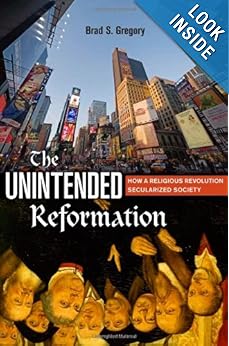About Me
Followers
Powered by Blogger.
Sunday, June 30, 2013
Book Review: The Unintended Reformation
Every so often a book scrambles the ways people look at
history, culture, society, economics, politics and church. Brad S. Gregory’s The Unintended Reformation is such a
book. Gregory, a professor of early modern history at Notre Dame, argues in six
long chapters and a conclusion, that the secular society in which we
increasingly live is the unintended by-product of the Reformation.
Gregory hits ideological capitalism particularly hard as a
product of secularism, made possible by the exile of Christian faith from
public life, and whose value of acquisitiveness rejects the historic Christian
critique of avarice and greed.
Academia comes under scrutiny for its belief in knowledge
for knowledge sake, rather than articulating a vision for social virtues, and
educating students to that end. I noted that the Goshen College emphasis on “building
the world peace by peace” is a delightful contrast.
 Gregory claims the church has either been banished from the
social and political realm, or has withdrawn willingly in order to survive, as
has happened in our own tradition. The modern secular nation state is left,
unaccountable to higher authority, with no resources to fashion an ethic of
good (that is a standard for what a flourishing human community might be, such
as shalom), but rather has emphasized an ethic of human rights. Ironically, the
latter has roots in the biblical understanding of human beings in God’s image,
even as secular states reject the bible as a source for shaping public life.
Gregory claims the church has either been banished from the
social and political realm, or has withdrawn willingly in order to survive, as
has happened in our own tradition. The modern secular nation state is left,
unaccountable to higher authority, with no resources to fashion an ethic of
good (that is a standard for what a flourishing human community might be, such
as shalom), but rather has emphasized an ethic of human rights. Ironically, the
latter has roots in the biblical understanding of human beings in God’s image,
even as secular states reject the bible as a source for shaping public life.
Modern secular states control the church, and define the
scope of its power and authority in public life. Churches are accountable to
it, not the other way around. The church does not get to decide whether or when
the state may go to war or use lethal force, but the state may demand that the
church and its members participate and respect its institutions of violence.
The secular state has domesticized faith.
Gregory is an equal opportunity offender, and every thinking
reader will take issue with some aspect of a book whose scope is so grand. The
book has been reviewed widely, with diverse opinions. For all, though, it is a
book to be reckoned with, and will
scramble ways of seeing for every reader.
Subscribe to:
Post Comments (Atom)

0 comments:
Post a Comment